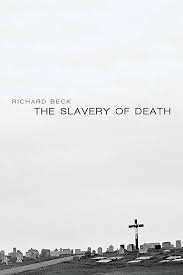It seems curious that the people who believe most fervently in divine healing also cling most doggedly to the technology of mortals.1Dugdale, L.S.. The Lost Art of Dying (p. 6).
It is indisputable our society is characterized by avoidance of death. Dominated by a secular ethos, such a reality is not surprising or unreasonable. What I find surprising and unreasonable is avoidance of death in many western Christian contexts. Any attempt to answer why will reveal numerous factors. One significant factor is the absence of a theology of death. A coherent theology of death, will not sanction avoidance, but will embrace death and give it its proper treatment.
This post examines Richard Beck’s book “The Slavery of Death” which I found helpful in developing a theology of death .
The Slavery of Death
The central contention of this book is that death, not sin, is the primary predicament of the human condition. Death is the cause of sin. More properly, the fear of death produces most of the sin in our lives.
The Slavery of Death (p. 3)
Beck’s contention, if correct, is a game changer. Subject to debate, the book makes a compelling case in favor of his contention. Wrestling with the possibility that sin is not the defining predicament of my life has touched and opened questions about much I have either taken for granted or left unexamined — original sin, salvation, substitutionary atonement, human depravity, satanic power, powers and principalities, timor mortis, and more, I am still processing and revisiting my thinking; in some cases I have come to new and different understandings. This post cannot do justice to the whole book. I will share some excerpts intended to stimulate enough curiosity that perhaps some will pursue a theology of death.
The reason Christ appeared was to free those who , in the words of Hebrews 2 : 15 , “ were all their lives enslaved to the fear of death . ”
…an exclusive focus on sin tends to oversimplify the dynamics of our moral struggles .
The power of death that the devil wields is characterized here as a slavery to the fear of death . It is not death per se that gives the devil power . It is , rather , the fear of death . It is this fear that creates the satanic influence , a fear that tempts us into sinful practices and lifestyles , a fear that keeps us demonically “ possessed ” in our idolatrous service to the principalities and powers .
Salvation , then , involves liberation from this fear . Salvation is emancipation for those who have been enslaved all of their lives by the fear of death . Salvation is a deliverance that sets us free from this power of the devil .
Jesus came to “ undo the works of the devil ” ( 1 John 3 : 8 )
Genesis 3 might be less interested in explaining why humans are “ depraved ” than it is in explaining why we die .
We do inherit a predicament from the Primal Couple , but what we inherit isn’t a moral stain . Rather , we inherit the world they have left us . We are exiles from Eden . The world around us is not as God intended it . Death exists , but this was not God’s plan . We were created for incorruption but find ourselves to be , in the words of Paul ( Romans 7 ) , possessors of bodies that are “ subject to death , ” a subjugation that brings about moral “ wretchedness . ”
…the issue here isn’t to displace the importance or role of sin in bringing about death , but to embed our understandings of human moral failure within a richer theological matrix .
if the satanic forces in our lives spring forth from the fear of death , then emancipation from this fear will move us from darkness to light , into a life characterized by a perfect love that has cast out fear .
To be set free from the slavery to the fear of death is to be liberated from self – interest in the act of genuine love . Thus the sign of Christ’s victory in our lives over sin , death , and the devil is the experience and expression of love . This is resurrection and life .
Death is—apart from God—the greatest moral power in this world, outlasting and subduing all other powers no matter how marvelous they may seem for the time being. This means, theologically speaking, that the object of allegiance and servitude, the real idol secreted within all idolatries, the power above all principalities and powers, —the idol of all idols—is death.2William Stringfellow
Resurrection in Christ, then, becomes freedom from death’s power in daily existence. William Stringfellow describes resurrection this way:
Resurrection . . . refers to the transcendence of the power of death and the fear or thrall of the power of death, here and now, in this life, in this world. Resurrection, thus, has to do with life and, indeed, the fulfillment of life before death. [Christ’s] power over death is effective not just at the terminal point of a person’s life but throughout one’s life, during this life in this world, right now. . . . His resurrection means the possibility of living in this life, in the very midst of death’s works, safe and free from death.
STILL ON THE JOURNEY
- 1Dugdale, L.S.. The Lost Art of Dying (p. 6).
- 2William Stringfellow
